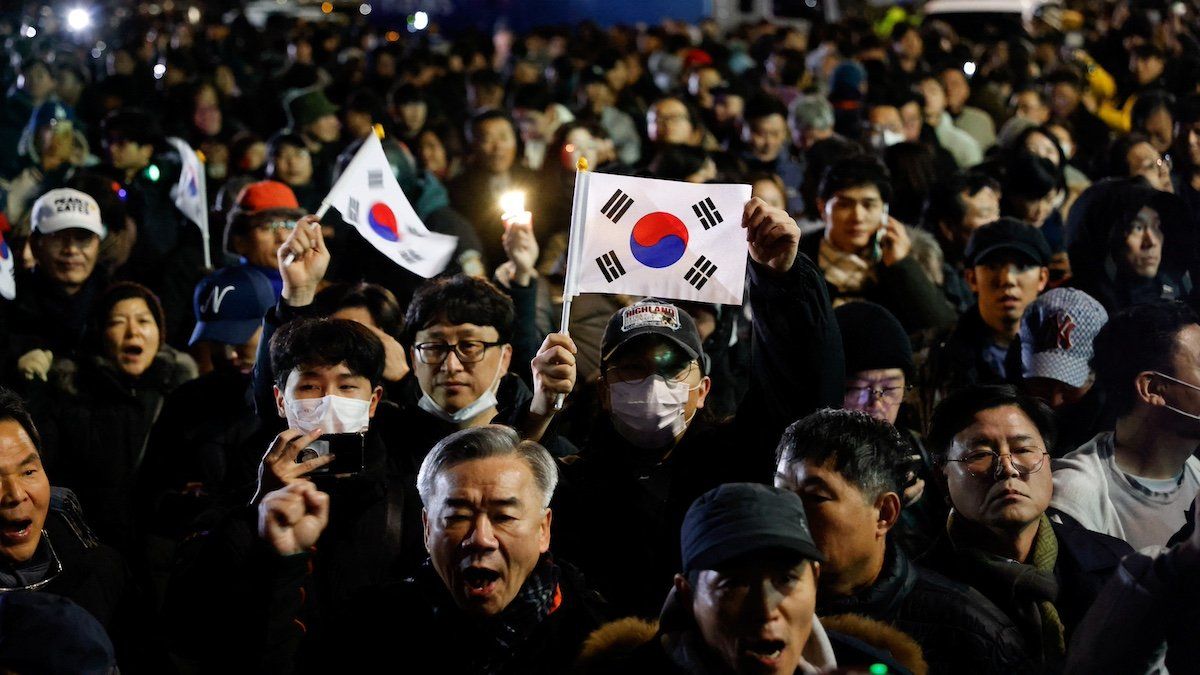In an unexpected, late-night speech on Tuesday, South Korean President Yoon Suk Yeol declared martial law, banning all political activity, taking control of all media, and suspending parliament. For all of a few hours, it turned out. Now, he's facing possible impeachment.
The announcement appeared to come as a total shock to all parties except the military, with even the head of Yoon’s party announcing he would “stop it, with the people.” Troops surrounded the National Assembly in Seoul soon after Yoon’s announcement to preempt resistance, but 190 of the chamber’s 300 lawmakers made it inside after midnight, with more held up at the gates.
Legislators unanimously voted to order Yoon to lift martial law, and Speaker Woo Son-shik declared the president’s action “null and void.”
Meanwhile, thousands of citizens arrived to demonstrate in the wee hours. They chanted “Abolish martial law!” and “Arrest Yoon Suk Yeol!” Demonstrators blocked an eight lane road and began organizing impromptu caravans to bring in protesters from across the country, but by 4 a.m. the crowds began to thin.
Soon after, Yoon caved in. He got back on television around 4:20 a.m. to announce he had called a cabinet meeting, and that martial law would be lifted within hours.
What the hell was Yoon thinking? It was “an act of political desperation,” says Eurasia Group’s Jeremy Chan. It wasn’t about North Korea or social order — despite Yoon’s claims, he explains. Yoon was “trying to send a message to the National Assembly and bring all legislative investigations to a halt.”
Yoon, who is deeply unpopular, has been trapped in a stalemate with the opposition that controls the legislature. They have repeatedly tried to launch corruption investigations against his wife, which Yoon always vetoes, and moved to impeach government prosecutors while stymying the president’s budget priorities. Still, Yoon’s calculus is not entirely clear, as he was not subject to impeachment proceedings.
What happens next? “It’s hard to see how Yoon survives this unless there’s some sort of other shoe to drop that we don’t know about yet,” said Chan.
On Wednesday, amid calls for Yoon to resign, South Korea’s opposition politicians began impeachment proceedings that could lead to a vote as early as Friday.
Two-thirds of legislators must vote in favor in order for Yoon to be impeached, and the opposition has the needed votes almost by themselves; it will take only a small number of votes from Yoon's party to pass. The impeachment must then be approved by the Constitutional Court of Korea, and if Yoon is removed from office, a new election will be held within two months.
Beyond that, it’s unclear whether Yoon might face any legal punishment for his attempt to suspend democracy, but two out of the last three South Korean presidents served jail time after their terms for considerably less serious violations.
How is the world reacting? Mostly with shock. US Deputy Secretary of State Kurt Campbell expressed “grave concern” but reiterated that Washington stands by its ally. President Joe Biden was briefed while traveling to Angola, and US officials say they are in contact with their counterparts in Seoul.
Plus: For more on why South Korea’s president declared martial law, check out Ian Bremmer’s latest Quick Take here.
